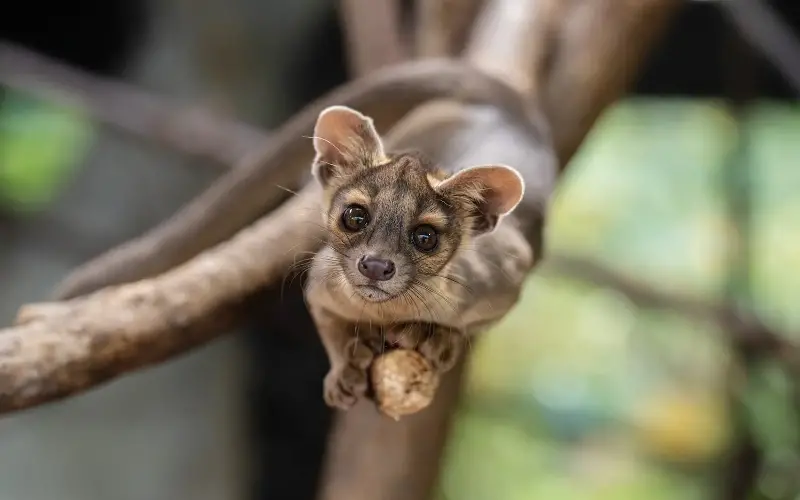
Pups of a rare cat-like mammal have been seen for the first time after a zoo used a technique borrowed from a dating show to encourage the animals to breed.
Chester Zoo managed to get their fossas to breed by keeping them separated by a large screen that was then slid open, allowing them to see each other.
The technique has been compared to the 1990s dating show Blind Date, in which contestants would ask each other questions while separated by a screen, before their date was revealed at the end of the episode.
The idea of the screen was to mimic the fossa’s behaviour in the wild.
As naturally solitary animals, they come together briefly to mate, so when Zaza, the male fossa, arrived from San Diego in May as part of an international breeding programme, zookeepers introduced him to female Shala.
“It’s all part of our slow and gradual introduction process,” said Jack Cunningham, a carnivore keeper at Chester Zoo. “They can see each other through a glass window and there’s also a screen we can slide open between their dens, which allows them to see each other without being able to get to one another straight away.”
The process proved a success, with Shala giving birth to two male pups and two females on July 8. The 12-week-old pups have now been spotted venturing out for the first time. Fossa pups are born blind, weighing just 100g – about the same as a small apple.
This is Shala’s second litter, her first with a previous mate having already found homes in the UK and abroad. They are one of only three litters born in all zoos in Europe this year.
Dave Hall, team manager of carnivores at the zoo, said: “Welcoming four newborn fossa pups is such an incredible moment for us – and seeing them venture out of the den for the very first time has been a real privilege.”
He added: “They’re already showing off their adventurous sides by climbing and exploring every branch they can find.
“Mum Shala certainly has her paws full when it comes to keeping track of them all, but she’s doing a brilliant job and is a very attentive mum.”
Fossas vulnerable to extinction
Fossas, the largest natural predator on Madagascar, are listed as vulnerable to extinction by the International Union for the Conservation of Nature, with fewer than 2,500 believed to still be in the wild.
Increasingly threatened by rapid urban development, they mostly hunt lemurs, birds, lizards and mice.
The pups have not been named yet, but the zoo will draw up a list of potentials for each as they develop their own personalities.
Mark Brayshaw, head of mammals at the zoo, welcomed the pups’ arrival as “a unique opportunity to learn more about their biology, behaviours and social dynamics”.
He added: “This insight helps us build a more complete picture of the species, which is then used to inform conservation efforts in the wild.”
